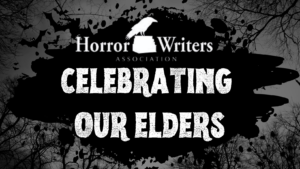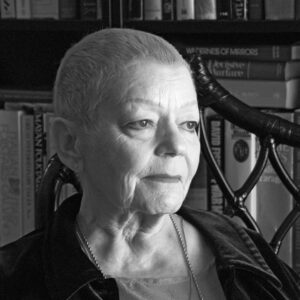Celebrating Our Elders: Interview with Chelsea Quinn Yarbro

Chelsea Quinn Yarbro started writing stories at age six; she’s still at it.
Did you start out writing or working in the horror field, and if so why? If not, what were you writing initially and what compelled you to move into horror?
I started out just writing stories of the kind that I like to read, and most of those were genre fiction. I began mainly with fantasy—not entirely fantasy, but for the most part fantasy—and since I’d read an awful lot of science fiction in my late youth and early teens, I decided I’d try my hand at that, too. Later I moved into horror because I like it.
Who were your influences as a writer when you started out and who, if anyone, continues to influence you?
A: First, and foremost, Shakespeare. And then, when it comes to horror, a whole kludge of Victorian short story writers like M. R. James and Sheridan Le Fanu and that whole camp. They all continue to influence me slightly. Then there are those writers who are no longer with us, like Roger Zelazny, Anne McCaffrey, and Theodore Sturgeon, all of whom I knew, and (even though I never met her) Shirley Jackson.
How have the changes in horror publishing over the past decades affected you?
Badly. The mid-list has almost vanished completely. And having the mid-list vanish for mid-list writers — which is most of us — means that you are not earning the kind of money you were able to make before.
Do you think you’ve encountered ageism? If so, how do you counteract or deal with it?
Well, I have encountered it, but what I really encounter a lot of is sexism. There are a whole bunch of writers out there who don’t like other writers who can write horror if they happen to be female. My usual way to deal with it is to ignore it. It doesn’t always work, but most of the time it does.
What do you wish you knew when you were just getting into the field?
The way that politics work in publishing offices.
Do you have any advice for writers just starting out?
Never imitate. Being influenced is all right. We all have influences. But when you imitate, you are striving to write the way someone else would, instead of telling your own stories in your own way.
Do you think older characters are represented fairly and honestly in horror fiction?
Fairly and honestly are probably not quite the terms to use. Every writer writes characters in their own way, realistic or not, as seems to them to pay off well in a given story. But that said, I’ve seen very few horror stories in which the older characters are represented as reacting to things in the way older people actually tend to react. This isn’t surprising. All characters reflect, in some way, the experience of their authors. So the younger the writer, the more likely it is that their older characters will be less authentic.
What are some of your favorite portrayals of older characters?
Uncle Silas, the title character in a novella by J. S. Le Fanu. Here you have a really, really unpleasant and spooky bad guy — that’s Uncle Silas — and you have a young woman who needs to be gotten out of a very sticky situation. What I find particularly charming about it is the only person who is helping her is another woman. Le Fanu did things like that, and some people didn’t like it. I think it was very brilliant.
Do you have anything you’d like to add that we haven’t asked?
When you’ve been in the business a long time, it’s really important to keep an eye not on where the market is going, but where the readers are going. You can find that out when you’re doing signings and things like that.




